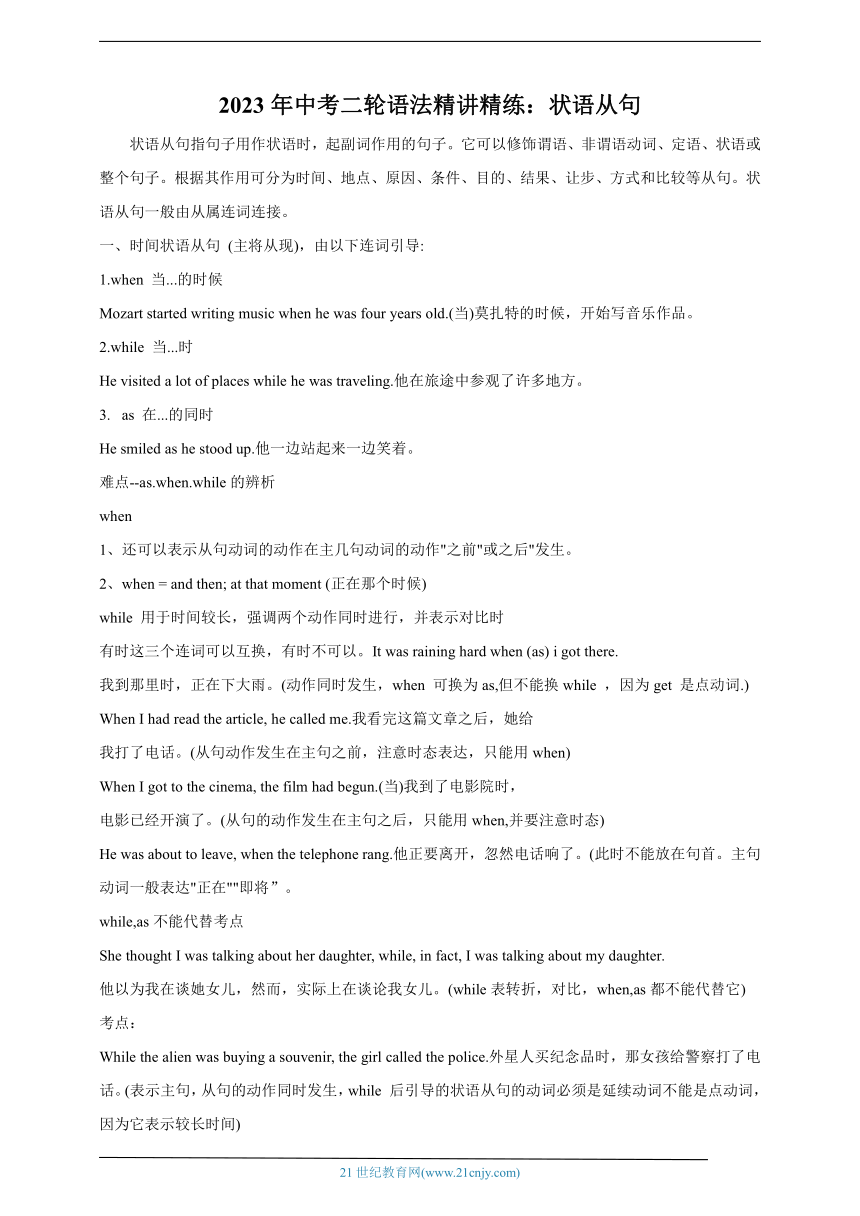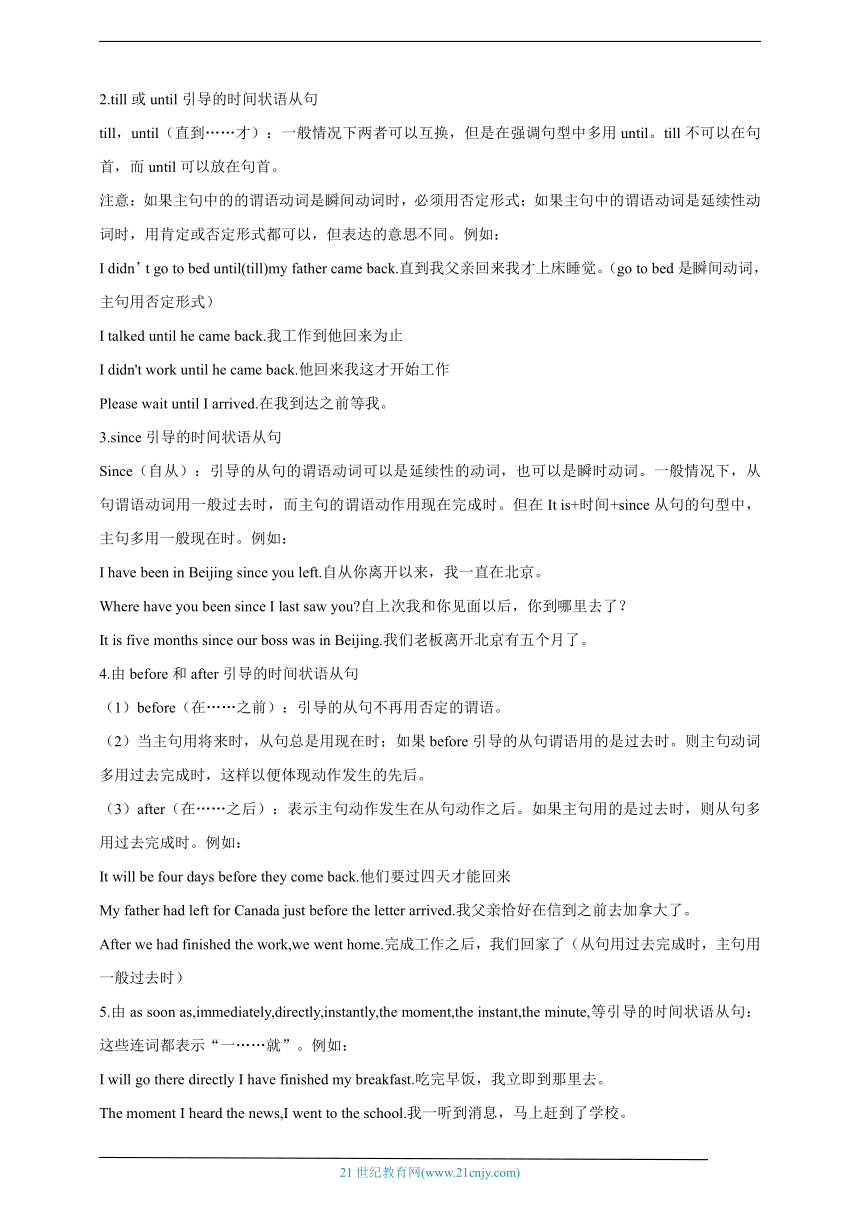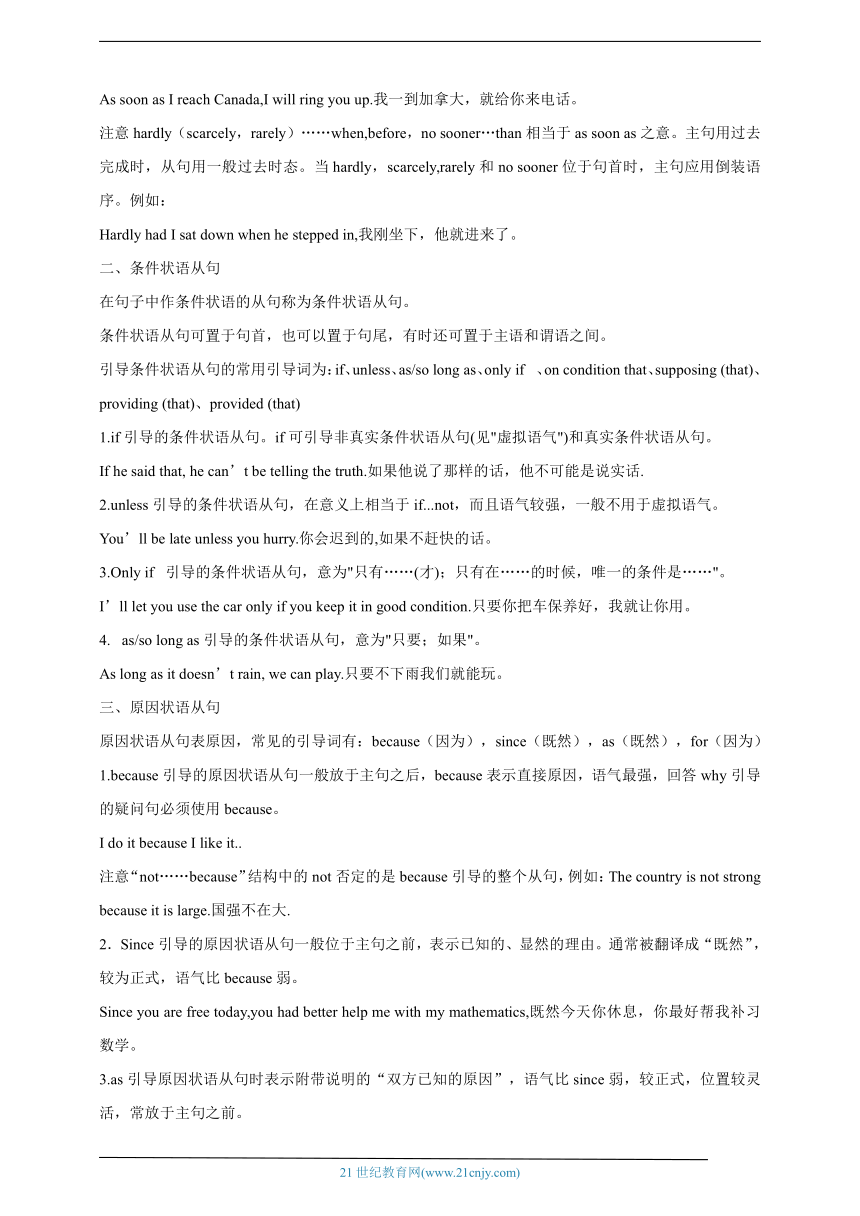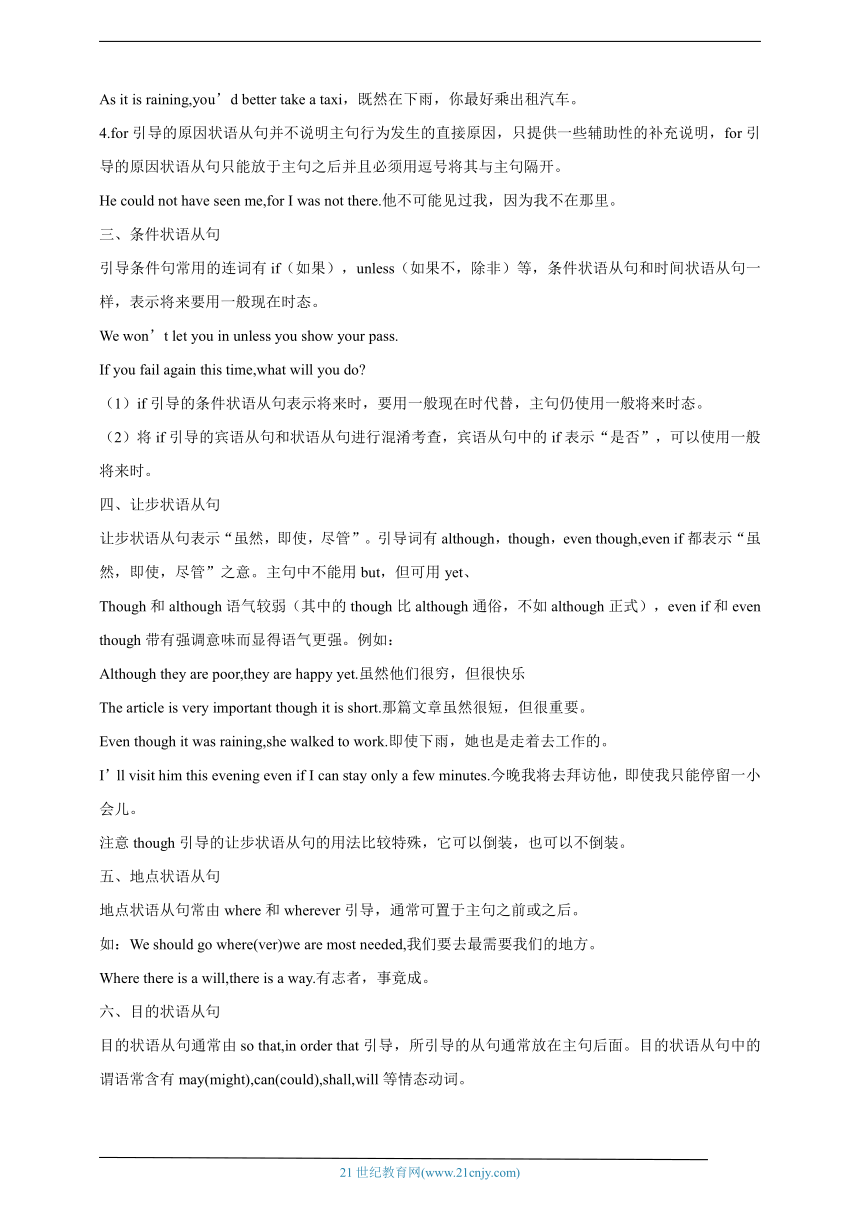2023年中考英语第二轮语法专题精讲精练:状语从句(含答案)
文档属性
| 名称 | 2023年中考英语第二轮语法专题精讲精练:状语从句(含答案) |  | |
| 格式 | zip | ||
| 文件大小 | 1.0MB | ||
| 资源类型 | 试卷 | ||
| 版本资源 | 通用版 | ||
| 科目 | 英语 | ||
| 更新时间 | 2023-03-03 16:49:12 | ||
图片预览




文档简介
2023年中考二轮语法精讲精练:状语从句
状语从句指句子用作状语时,起副词作用的句子。它可以修饰谓语、非谓语动词、定语、状语或整个句子。根据其作用可分为时间、地点、原因、条件、目的、结果、让步、方式和比较等从句。状语从句一般由从属连词连接。
一、时间状语从句 (主将从现),由以下连词引导:
1.when 当...的时候
Mozart started writing music when he was four years old.(当)莫扎特的时候,开始写音乐作品。
2.while 当...时
He visited a lot of places while he was traveling.他在旅途中参观了许多地方。
as 在...的同时
He smiled as he stood up.他一边站起来一边笑着。
难点--as.when.while的辨析
when
1、还可以表示从句动词的动作在主几句动词的动作"之前"或之后"发生。
2、when = and then; at that moment (正在那个时候)
while 用于时间较长,强调两个动作同时进行,并表示对比时
有时这三个连词可以互换,有时不可以。It was raining hard when (as) i got there.
我到那里时,正在下大雨。(动作同时发生,when 可换为as,但不能换while ,因为get 是点动词.)
When I had read the article, he called me.我看完这篇文章之后,她给
我打了电话。(从句动作发生在主句之前,注意时态表达,只能用when)
When I got to the cinema, the film had begun.(当)我到了电影院时,
电影已经开演了。(从句的动作发生在主句之后,只能用when,并要注意时态)
He was about to leave, when the telephone rang.他正要离开,忽然电话响了。(此时不能放在句首。主句动词一般表达"正在""即将”。
while,as不能代替考点
She thought I was talking about her daughter, while, in fact, I was talking about my daughter.
他以为我在谈她女儿,然而,实际上在谈论我女儿。(while表转折,对比,when,as都不能代替它)
考点:
While the alien was buying a souvenir, the girl called the police.外星人买纪念品时,那女孩给警察打了电话。(表示主句,从句的动作同时发生,while 后引导的状语从句的动词必须是延续动词不能是点动词,
因为它表示较长时间)
2.till或until引导的时间状语从句
till,until(直到……才):一般情况下两者可以互换,但是在强调句型中多用until。till不可以在句首,而until可以放在句首。
注意:如果主句中的的谓语动词是瞬间动词时,必须用否定形式;如果主句中的谓语动词是延续性动词时,用肯定或否定形式都可以,但表达的意思不同。例如:
I didn’t go to bed until(till)my father came back.直到我父亲回来我才上床睡觉。(go to bed是瞬间动词,主句用否定形式)
I talked until he came back.我工作到他回来为止
I didn't work until he came back.他回来我这才开始工作
Please wait until I arrived.在我到达之前等我。
3.since引导的时间状语从句
Since(自从):引导的从句的谓语动词可以是延续性的动词,也可以是瞬时动词。一般情况下,从句谓语动词用一般过去时,而主句的谓语动作用现在完成时。但在It is+时间+since从句的句型中,主句多用一般现在时。例如:
I have been in Beijing since you left.自从你离开以来,我一直在北京。
Where have you been since I last saw you 自上次我和你见面以后,你到哪里去了?
It is five months since our boss was in Beijing.我们老板离开北京有五个月了。
4.由before和after引导的时间状语从句
(1)before(在……之前):引导的从句不再用否定的谓语。
(2)当主句用将来时,从句总是用现在时;如果before引导的从句谓语用的是过去时。则主句动词多用过去完成时,这样以便体现动作发生的先后。
(3)after(在……之后):表示主句动作发生在从句动作之后。如果主句用的是过去时,则从句多用过去完成时。例如:
It will be four days before they come back.他们要过四天才能回来
My father had left for Canada just before the letter arrived.我父亲恰好在信到之前去加拿大了。
After we had finished the work,we went home.完成工作之后,我们回家了(从句用过去完成时,主句用一般过去时)
5.由as soon as,immediately,directly,instantly,the moment,the instant,the minute,等引导的时间状语从句:这些连词都表示“一……就”。例如:
I will go there directly I have finished my breakfast.吃完早饭,我立即到那里去。
The moment I heard the news,I went to the school.我一听到消息,马上赶到了学校。
As soon as I reach Canada,I will ring you up.我一到加拿大,就给你来电话。
注意hardly(scarcely,rarely)……when,before,no sooner…than相当于as soon as之意。主句用过去完成时,从句用一般过去时态。当hardly,scarcely,rarely和no sooner位于句首时,主句应用倒装语序。例如:
Hardly had I sat down when he stepped in,我刚坐下,他就进来了。
二、条件状语从句
在句子中作条件状语的从句称为条件状语从句。
条件状语从句可置于句首,也可以置于句尾,有时还可置于主语和谓语之间。
引导条件状语从句的常用引导词为:if、unless、as/so long as、only if 、on condition that、supposing (that)、providing (that)、provided (that)
1.if引导的条件状语从句。if可引导非真实条件状语从句(见"虚拟语气")和真实条件状语从句。
If he said that, he can’t be telling the truth.如果他说了那样的话,他不可能是说实话.
2.unless引导的条件状语从句,在意义上相当于if...not,而且语气较强,一般不用于虚拟语气。
You’ll be late unless you hurry.你会迟到的,如果不赶快的话。
3.Only if 引导的条件状语从句,意为"只有……(才);只有在……的时候,唯一的条件是……"。
I’ll let you use the car only if you keep it in good condition.只要你把车保养好,我就让你用。
4. as/so long as引导的条件状语从句,意为"只要;如果"。
As long as it doesn’t rain, we can play.只要不下雨我们就能玩。
三、原因状语从句
原因状语从句表原因,常见的引导词有:because(因为),since(既然),as(既然),for(因为)
1.because引导的原因状语从句一般放于主句之后,because表示直接原因,语气最强,回答why引导的疑问句必须使用because。
I do it because I like it..
注意“not……because”结构中的not否定的是because引导的整个从句,例如:The country is not strong because it is large.国强不在大.
2.Since引导的原因状语从句一般位于主句之前,表示已知的、显然的理由。通常被翻译成“既然”,较为正式,语气比because弱。
Since you are free today,you had better help me with my mathematics,既然今天你休息,你最好帮我补习数学。
3.as引导原因状语从句时表示附带说明的“双方已知的原因”,语气比since弱,较正式,位置较灵活,常放于主句之前。
As it is raining,you’d better take a taxi,既然在下雨,你最好乘出租汽车。
4.for引导的原因状语从句并不说明主句行为发生的直接原因,只提供一些辅助性的补充说明,for引导的原因状语从句只能放于主句之后并且必须用逗号将其与主句隔开。
He could not have seen me,for I was not there.他不可能见过我,因为我不在那里。
三、条件状语从句
引导条件句常用的连词有if(如果),unless(如果不,除非)等,条件状语从句和时间状语从句一样,表示将来要用一般现在时态。
We won’t let you in unless you show your pass.
If you fail again this time,what will you do
(1)if引导的条件状语从句表示将来时,要用一般现在时代替,主句仍使用一般将来时态。
(2)将if引导的宾语从句和状语从句进行混淆考查,宾语从句中的if表示“是否”,可以使用一般将来时。
四、让步状语从句
让步状语从句表示“虽然,即使,尽管”。引导词有although,though,even though,even if都表示“虽然,即使,尽管”之意。主句中不能用but,但可用yet、
Though和although语气较弱(其中的though比although通俗,不如although正式),even if和even though带有强调意味而显得语气更强。例如:
Although they are poor,they are happy yet.虽然他们很穷,但很快乐
The article is very important though it is short.那篇文章虽然很短,但很重要。
Even though it was raining,she walked to work.即使下雨,她也是走着去工作的。
I’ll visit him this evening even if I can stay only a few minutes.今晚我将去拜访他,即使我只能停留一小会儿。
注意though引导的让步状语从句的用法比较特殊,它可以倒装,也可以不倒装。
五、地点状语从句
地点状语从句常由where和wherever引导,通常可置于主句之前或之后。
如:We should go where(ver)we are most needed,我们要去最需要我们的地方。
Where there is a will,there is a way.有志者,事竟成。
六、目的状语从句
目的状语从句通常由so that,in order that引导,所引导的从句通常放在主句后面。目的状语从句中的谓语常含有may(might),can(could),shall,will等情态动词。
如:He always takes a seat in the first row so that/in order that he can hear better.
=In order that he can hear better,he always takes a seat in the first row.为了听得更清楚,他总是坐前排的座位。
七、结果状语从句
结果状语从句常由so that,so…that,such…that等引导,放在主句之后,so…that与such…that句型在一定条件下可转换。
如:He made such an excellent speech that everyone admired him.
=He made so excellent a speech that everyone admired him.他的演讲如此精彩以至于每个人都很钦佩他。
注意so that引导结果状语从句和目的状语从句的辨别
so that从句之前有个逗号的常为结果状语从句,因表示某一行为带来的结果,从句中的时态常为过去式;
so that从句中有may(might),can(could),should,will等情态动词的通常是目的状语从句。
如:I wrote as clearly as possible,so that I got high marks.(目的)我尽可能地写清楚些,这样可以得高分。
He went to the lecture early so that he could get a good seat.(目的)他很早就去听报告了,以便可以找到一个好座位。
He went to the lecture early,so that he got a good seat.(结果)他很早就去听报告了,这样他就找到一个好座位。
八、比较状语从句
1.比较状语从句常由as…as,not so(as),than引导。比较从句部分常为省略句。
如His brother is as handsome as he(is)/him.(非正式英语中可用宾格him)他弟弟和他一样英俊。
He swims faster than any other student in his class(does).他比班上其他任何人都游得快。
2.通常把the more…the more…结构也归为比较从句,意为:“越…越”。
如:The harder you work,the greater progress you’ll make.你越努力学习,就会取得越大的进步。
The less she worried,the better she worked.她担心得越少,就工作得越好。
九、方式状语从句
方式状语从句通常由as, (just) as…so…, as if, as though引导。
1) as, (just) as…so…引导的方式状语从句通常位于主句后,但在(just) as…so…结构中位于句首,这时as从句带有比喻的含义,意思是正如…,就像,多用于正式文体,例如:
Always do to the others as you would be done by.你希望人家怎样待你,你就要怎样待人。
As water is to fish, so air is to man.我们离不开空气,犹如鱼儿离不开水。
Just as we sweep our rooms, so we should sweep backward ideas from our minds.
正如打扫房屋一样,我们也要扫除我们头脑中落后的东西。
2) as if, as though
两者的意义和用法相同,引出的状语从句谓语多用虚拟语气,表示与事实相反,有时也用陈述语气,表示所说情况是事实或实现的可能性较大。汉译常作仿佛……似的,好像……似的,例如:
They completely ignore these facts as if (as though) they never existed.
他们完全忽略了这些事实,就仿佛它不存在似的。(与事实相反,谓语用虚拟语气。)
He looks as if (as though) he had been hit by lighting.
他那样子就像被雷击了似的。(与事实相反,谓语用虚拟语气。)
It looks as if the weather may pick up very soon.看来天气很快就会好起来。(实现的可能性较大,谓语用陈述语气。)
说明:as if / as though也可以引导一个分词短语、不定式短语或无动词短语,例如:
He stared at me as if seeing me for first time.他目不转睛地看着我,就像第一次看见我似的。
He cleared his throat as if to say something.他清了清嗓子,像要说什么似的。
The waves dashed on the rocks as if in anger.波涛冲击着岩石,好像很愤怒。
状语从句
1 The meeting didn't start___ everyone was there.
A. because B. until C. why D. if
2 The boy ___ to bed ___ his mother came in.
A. went not; until B. didn't go; after C. went; until D. didn't go; until
3 I won't believe you___ I have seen it with my own eyes.
A. before B. until C. after D. when
4 He ___ home ___ she was satisfied ___ his answer yesterday.
A. didn't go; until; with B. wasn't go; after; to
C. doesn't go; before; with D. didn't go; until; to
5 He ___ back until the work ___ done.
A. isn't; will be B. isn't; is C. won't be; will be D. won't be; is
6 They didn't start the work ___ their teacher came back.
A. until B. while C. as soon as D. if
7. Tom will call me as soon as he ___ Shanghai.
A. arrives B. will reach C. arrives in D. get to
8. I'm sure he'll come to see me before he ___ Beijing.
A. will leave B. is leaving C. leave D. leaves
9. I will tell him the news as soon as he___ back.
A. come B. comes C. will come D. came
10. Tom has got a watch. He ___ it for two years. It _______ by his father.
A. has bought; was bought B. has got; is bought , C. was bought; has bought . D. has had; was bought
11. When he got to the station, the train ___.
A. left B. had left C. leaves D. has left
12. The boy told his father what he ___ in the street.
A. saw B. have seen C. had seen D. see
13.We ___ TV when the telephone ____.
A. watched; was ringing B. were watching; rang C. watch; rings D. are watching; rang
14.By the end of last term, I___ ten books.
A. had finished reading B. have finish reading C. had finish to read D. finish read
15. I ___ you for a long time. Where ___ you ___
A. didn't see; did; go B. didn't see; have; gone
C. haven't seen; have; been D. haven't seen; have; gone
16. Tom___ China for 3 years.
A. has been B. has been in C. has been to D. has been at
17. I won't go to see the film tonight, because I ___ my ticket.
A. lost B. have lost C. will lose D. didn't lose
18.-Hello! May I speak to Bob
-Sorry, but he ___ for a month.
A. had been away B. was left C. left D. has been away
19. I ___ him since I began to live in the city.
A. know B. have known C. knew D. will know
答案:1-5BDBAD 6-10 ACDBD 11-15 BCBAC 16-20BBDBC
21世纪教育网(www.21cnjy.com)
状语从句指句子用作状语时,起副词作用的句子。它可以修饰谓语、非谓语动词、定语、状语或整个句子。根据其作用可分为时间、地点、原因、条件、目的、结果、让步、方式和比较等从句。状语从句一般由从属连词连接。
一、时间状语从句 (主将从现),由以下连词引导:
1.when 当...的时候
Mozart started writing music when he was four years old.(当)莫扎特的时候,开始写音乐作品。
2.while 当...时
He visited a lot of places while he was traveling.他在旅途中参观了许多地方。
as 在...的同时
He smiled as he stood up.他一边站起来一边笑着。
难点--as.when.while的辨析
when
1、还可以表示从句动词的动作在主几句动词的动作"之前"或之后"发生。
2、when = and then; at that moment (正在那个时候)
while 用于时间较长,强调两个动作同时进行,并表示对比时
有时这三个连词可以互换,有时不可以。It was raining hard when (as) i got there.
我到那里时,正在下大雨。(动作同时发生,when 可换为as,但不能换while ,因为get 是点动词.)
When I had read the article, he called me.我看完这篇文章之后,她给
我打了电话。(从句动作发生在主句之前,注意时态表达,只能用when)
When I got to the cinema, the film had begun.(当)我到了电影院时,
电影已经开演了。(从句的动作发生在主句之后,只能用when,并要注意时态)
He was about to leave, when the telephone rang.他正要离开,忽然电话响了。(此时不能放在句首。主句动词一般表达"正在""即将”。
while,as不能代替考点
She thought I was talking about her daughter, while, in fact, I was talking about my daughter.
他以为我在谈她女儿,然而,实际上在谈论我女儿。(while表转折,对比,when,as都不能代替它)
考点:
While the alien was buying a souvenir, the girl called the police.外星人买纪念品时,那女孩给警察打了电话。(表示主句,从句的动作同时发生,while 后引导的状语从句的动词必须是延续动词不能是点动词,
因为它表示较长时间)
2.till或until引导的时间状语从句
till,until(直到……才):一般情况下两者可以互换,但是在强调句型中多用until。till不可以在句首,而until可以放在句首。
注意:如果主句中的的谓语动词是瞬间动词时,必须用否定形式;如果主句中的谓语动词是延续性动词时,用肯定或否定形式都可以,但表达的意思不同。例如:
I didn’t go to bed until(till)my father came back.直到我父亲回来我才上床睡觉。(go to bed是瞬间动词,主句用否定形式)
I talked until he came back.我工作到他回来为止
I didn't work until he came back.他回来我这才开始工作
Please wait until I arrived.在我到达之前等我。
3.since引导的时间状语从句
Since(自从):引导的从句的谓语动词可以是延续性的动词,也可以是瞬时动词。一般情况下,从句谓语动词用一般过去时,而主句的谓语动作用现在完成时。但在It is+时间+since从句的句型中,主句多用一般现在时。例如:
I have been in Beijing since you left.自从你离开以来,我一直在北京。
Where have you been since I last saw you 自上次我和你见面以后,你到哪里去了?
It is five months since our boss was in Beijing.我们老板离开北京有五个月了。
4.由before和after引导的时间状语从句
(1)before(在……之前):引导的从句不再用否定的谓语。
(2)当主句用将来时,从句总是用现在时;如果before引导的从句谓语用的是过去时。则主句动词多用过去完成时,这样以便体现动作发生的先后。
(3)after(在……之后):表示主句动作发生在从句动作之后。如果主句用的是过去时,则从句多用过去完成时。例如:
It will be four days before they come back.他们要过四天才能回来
My father had left for Canada just before the letter arrived.我父亲恰好在信到之前去加拿大了。
After we had finished the work,we went home.完成工作之后,我们回家了(从句用过去完成时,主句用一般过去时)
5.由as soon as,immediately,directly,instantly,the moment,the instant,the minute,等引导的时间状语从句:这些连词都表示“一……就”。例如:
I will go there directly I have finished my breakfast.吃完早饭,我立即到那里去。
The moment I heard the news,I went to the school.我一听到消息,马上赶到了学校。
As soon as I reach Canada,I will ring you up.我一到加拿大,就给你来电话。
注意hardly(scarcely,rarely)……when,before,no sooner…than相当于as soon as之意。主句用过去完成时,从句用一般过去时态。当hardly,scarcely,rarely和no sooner位于句首时,主句应用倒装语序。例如:
Hardly had I sat down when he stepped in,我刚坐下,他就进来了。
二、条件状语从句
在句子中作条件状语的从句称为条件状语从句。
条件状语从句可置于句首,也可以置于句尾,有时还可置于主语和谓语之间。
引导条件状语从句的常用引导词为:if、unless、as/so long as、only if 、on condition that、supposing (that)、providing (that)、provided (that)
1.if引导的条件状语从句。if可引导非真实条件状语从句(见"虚拟语气")和真实条件状语从句。
If he said that, he can’t be telling the truth.如果他说了那样的话,他不可能是说实话.
2.unless引导的条件状语从句,在意义上相当于if...not,而且语气较强,一般不用于虚拟语气。
You’ll be late unless you hurry.你会迟到的,如果不赶快的话。
3.Only if 引导的条件状语从句,意为"只有……(才);只有在……的时候,唯一的条件是……"。
I’ll let you use the car only if you keep it in good condition.只要你把车保养好,我就让你用。
4. as/so long as引导的条件状语从句,意为"只要;如果"。
As long as it doesn’t rain, we can play.只要不下雨我们就能玩。
三、原因状语从句
原因状语从句表原因,常见的引导词有:because(因为),since(既然),as(既然),for(因为)
1.because引导的原因状语从句一般放于主句之后,because表示直接原因,语气最强,回答why引导的疑问句必须使用because。
I do it because I like it..
注意“not……because”结构中的not否定的是because引导的整个从句,例如:The country is not strong because it is large.国强不在大.
2.Since引导的原因状语从句一般位于主句之前,表示已知的、显然的理由。通常被翻译成“既然”,较为正式,语气比because弱。
Since you are free today,you had better help me with my mathematics,既然今天你休息,你最好帮我补习数学。
3.as引导原因状语从句时表示附带说明的“双方已知的原因”,语气比since弱,较正式,位置较灵活,常放于主句之前。
As it is raining,you’d better take a taxi,既然在下雨,你最好乘出租汽车。
4.for引导的原因状语从句并不说明主句行为发生的直接原因,只提供一些辅助性的补充说明,for引导的原因状语从句只能放于主句之后并且必须用逗号将其与主句隔开。
He could not have seen me,for I was not there.他不可能见过我,因为我不在那里。
三、条件状语从句
引导条件句常用的连词有if(如果),unless(如果不,除非)等,条件状语从句和时间状语从句一样,表示将来要用一般现在时态。
We won’t let you in unless you show your pass.
If you fail again this time,what will you do
(1)if引导的条件状语从句表示将来时,要用一般现在时代替,主句仍使用一般将来时态。
(2)将if引导的宾语从句和状语从句进行混淆考查,宾语从句中的if表示“是否”,可以使用一般将来时。
四、让步状语从句
让步状语从句表示“虽然,即使,尽管”。引导词有although,though,even though,even if都表示“虽然,即使,尽管”之意。主句中不能用but,但可用yet、
Though和although语气较弱(其中的though比although通俗,不如although正式),even if和even though带有强调意味而显得语气更强。例如:
Although they are poor,they are happy yet.虽然他们很穷,但很快乐
The article is very important though it is short.那篇文章虽然很短,但很重要。
Even though it was raining,she walked to work.即使下雨,她也是走着去工作的。
I’ll visit him this evening even if I can stay only a few minutes.今晚我将去拜访他,即使我只能停留一小会儿。
注意though引导的让步状语从句的用法比较特殊,它可以倒装,也可以不倒装。
五、地点状语从句
地点状语从句常由where和wherever引导,通常可置于主句之前或之后。
如:We should go where(ver)we are most needed,我们要去最需要我们的地方。
Where there is a will,there is a way.有志者,事竟成。
六、目的状语从句
目的状语从句通常由so that,in order that引导,所引导的从句通常放在主句后面。目的状语从句中的谓语常含有may(might),can(could),shall,will等情态动词。
如:He always takes a seat in the first row so that/in order that he can hear better.
=In order that he can hear better,he always takes a seat in the first row.为了听得更清楚,他总是坐前排的座位。
七、结果状语从句
结果状语从句常由so that,so…that,such…that等引导,放在主句之后,so…that与such…that句型在一定条件下可转换。
如:He made such an excellent speech that everyone admired him.
=He made so excellent a speech that everyone admired him.他的演讲如此精彩以至于每个人都很钦佩他。
注意so that引导结果状语从句和目的状语从句的辨别
so that从句之前有个逗号的常为结果状语从句,因表示某一行为带来的结果,从句中的时态常为过去式;
so that从句中有may(might),can(could),should,will等情态动词的通常是目的状语从句。
如:I wrote as clearly as possible,so that I got high marks.(目的)我尽可能地写清楚些,这样可以得高分。
He went to the lecture early so that he could get a good seat.(目的)他很早就去听报告了,以便可以找到一个好座位。
He went to the lecture early,so that he got a good seat.(结果)他很早就去听报告了,这样他就找到一个好座位。
八、比较状语从句
1.比较状语从句常由as…as,not so(as),than引导。比较从句部分常为省略句。
如His brother is as handsome as he(is)/him.(非正式英语中可用宾格him)他弟弟和他一样英俊。
He swims faster than any other student in his class(does).他比班上其他任何人都游得快。
2.通常把the more…the more…结构也归为比较从句,意为:“越…越”。
如:The harder you work,the greater progress you’ll make.你越努力学习,就会取得越大的进步。
The less she worried,the better she worked.她担心得越少,就工作得越好。
九、方式状语从句
方式状语从句通常由as, (just) as…so…, as if, as though引导。
1) as, (just) as…so…引导的方式状语从句通常位于主句后,但在(just) as…so…结构中位于句首,这时as从句带有比喻的含义,意思是正如…,就像,多用于正式文体,例如:
Always do to the others as you would be done by.你希望人家怎样待你,你就要怎样待人。
As water is to fish, so air is to man.我们离不开空气,犹如鱼儿离不开水。
Just as we sweep our rooms, so we should sweep backward ideas from our minds.
正如打扫房屋一样,我们也要扫除我们头脑中落后的东西。
2) as if, as though
两者的意义和用法相同,引出的状语从句谓语多用虚拟语气,表示与事实相反,有时也用陈述语气,表示所说情况是事实或实现的可能性较大。汉译常作仿佛……似的,好像……似的,例如:
They completely ignore these facts as if (as though) they never existed.
他们完全忽略了这些事实,就仿佛它不存在似的。(与事实相反,谓语用虚拟语气。)
He looks as if (as though) he had been hit by lighting.
他那样子就像被雷击了似的。(与事实相反,谓语用虚拟语气。)
It looks as if the weather may pick up very soon.看来天气很快就会好起来。(实现的可能性较大,谓语用陈述语气。)
说明:as if / as though也可以引导一个分词短语、不定式短语或无动词短语,例如:
He stared at me as if seeing me for first time.他目不转睛地看着我,就像第一次看见我似的。
He cleared his throat as if to say something.他清了清嗓子,像要说什么似的。
The waves dashed on the rocks as if in anger.波涛冲击着岩石,好像很愤怒。
状语从句
1 The meeting didn't start___ everyone was there.
A. because B. until C. why D. if
2 The boy ___ to bed ___ his mother came in.
A. went not; until B. didn't go; after C. went; until D. didn't go; until
3 I won't believe you___ I have seen it with my own eyes.
A. before B. until C. after D. when
4 He ___ home ___ she was satisfied ___ his answer yesterday.
A. didn't go; until; with B. wasn't go; after; to
C. doesn't go; before; with D. didn't go; until; to
5 He ___ back until the work ___ done.
A. isn't; will be B. isn't; is C. won't be; will be D. won't be; is
6 They didn't start the work ___ their teacher came back.
A. until B. while C. as soon as D. if
7. Tom will call me as soon as he ___ Shanghai.
A. arrives B. will reach C. arrives in D. get to
8. I'm sure he'll come to see me before he ___ Beijing.
A. will leave B. is leaving C. leave D. leaves
9. I will tell him the news as soon as he___ back.
A. come B. comes C. will come D. came
10. Tom has got a watch. He ___ it for two years. It _______ by his father.
A. has bought; was bought B. has got; is bought , C. was bought; has bought . D. has had; was bought
11. When he got to the station, the train ___.
A. left B. had left C. leaves D. has left
12. The boy told his father what he ___ in the street.
A. saw B. have seen C. had seen D. see
13.We ___ TV when the telephone ____.
A. watched; was ringing B. were watching; rang C. watch; rings D. are watching; rang
14.By the end of last term, I___ ten books.
A. had finished reading B. have finish reading C. had finish to read D. finish read
15. I ___ you for a long time. Where ___ you ___
A. didn't see; did; go B. didn't see; have; gone
C. haven't seen; have; been D. haven't seen; have; gone
16. Tom___ China for 3 years.
A. has been B. has been in C. has been to D. has been at
17. I won't go to see the film tonight, because I ___ my ticket.
A. lost B. have lost C. will lose D. didn't lose
18.-Hello! May I speak to Bob
-Sorry, but he ___ for a month.
A. had been away B. was left C. left D. has been away
19. I ___ him since I began to live in the city.
A. know B. have known C. knew D. will know
答案:1-5BDBAD 6-10 ACDBD 11-15 BCBAC 16-20BBDBC
21世纪教育网(www.21cnjy.com)
同课章节目录
- 词法
- 名词
- 动词和动词短语
- 动词语态
- 动词时态
- 助动词和情态动词
- 非谓语动词
- 冠词
- 代词
- 数词和量词
- 形容词副词及其比较等级
- 介词和介词短语
- 连词和感叹词
- 构词法
- 相似、相近词比较
- 句法
- 陈述句
- 一般疑问句和否定疑问句
- 特殊疑问句及选择疑问句
- 反意疑问句
- 存在句(There be句型)
- 宾语从句
- 定语从句
- 状语从句
- 主谓一致问题
- 简单句
- 并列句
- 复合句
- 主谓一致
- 主、表语从句
- 名词性从句
- 直接引语和间接引语
- 虚拟语气
- 感叹句
- 强调句
- 倒装句
- 祈使句
- 句子的成分
- 句子的分类
- 题型专区
- 单项选择部分
- 易错题
- 完形填空
- 阅读理解
- 词汇练习
- 听说训练
- 句型转换
- 补全对话
- 短文改错
- 翻译
- 书面表达
- 任务型阅读
- 语法填空
- 其他资料
